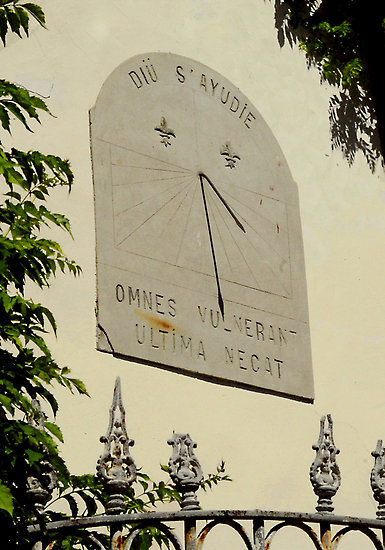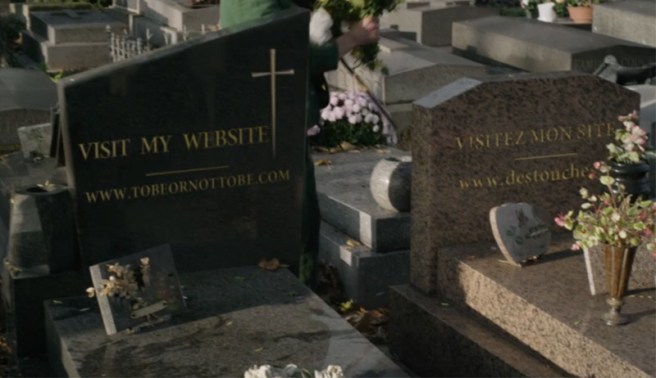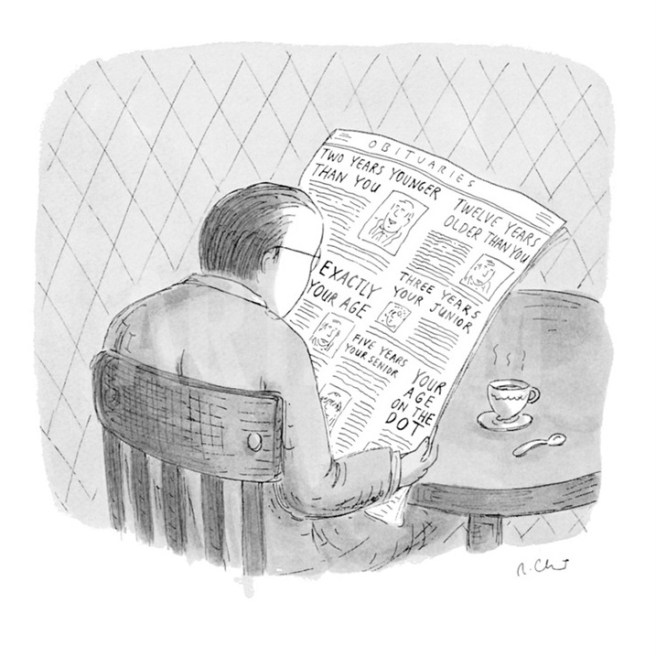To be told that a scene of mass death is the result of an accident or terrorism is to be given not only an explanation of the cause but also an idea of how to reckon with the consequence.
Tag: death
Grief is as unique as a fingerprint.
Man vs. Corpse
The postapocalyptic scenario—the future in which everyone’s a corpse (except you)—must be, at this point, one of the most thoroughly imagined fictions of the age.
How we’re dying
Catching up on my RSS, seeing these two from Marginal Revolution in close succession caught my attention. I had no idea:
Suicides outnumber homicides in the United States by 3:1.
Prescription painkillers now kill more Americans than heroin and cocaine combined, according to the CDC.
:( Take care.
Each of us is born with a series of built-in confusions that are probably somehow Darwinian. These are: (1) we’re central to the universe (that is, our personal story is the main and most interesting story, the only story, really); (2) we’re separate from the universe (there’s US and then, out there, all that other junk – dogs and swing-sets, and the State of Nebraska and low-hanging clouds and, you know, other people), and (3) we’re permanent (death is real, o.k., sure – for you, but not for me).
Hilary Mantel reviews ‘Tormented Hope’ by Brian Dillon · LRB 5 November 2009
Anxiety about a specific symptom is more bearable and easier to rationalise than the diffuse ontological malaise that used to be known as spiritual despair. It is easier to say ‘my knee is killing me,’ because we know it isn’t, than to dwell in the belief that the clock is ticking and that the journey from birth to death is a journey to extinction; it is better to have a symptom than to have a void inside.
Hilary Mantel reviews ‘Tormented Hope’ by Brian Dillon · LRB 5 November 2009
The Mega-Death of Summer Movies – Richard Lawson – The Atlantic Wire
I know it would be a bummer to show 10,000 funerals in a summertime movie, but then maybe don’t kill 10,000 people while people are trying to have a good time?
The Mega-Death of Summer Movies – Richard Lawson – The Atlantic Wire

Memento mori – Wikipedia, the free encyclopedia.
Timepieces were formerly an apt reminder that your time on Earth grows shorter with each passing minute. Public clocks would be decorated with mottos such as ultima forsan (“perhaps the last” [hour]) or vulnerant omnes, ultima necat (“they all wound, and the last kills”).
The Antidote (review)

As the Buddha said two and a half thousand years ago, we’re all out of our fucking minds! That’s just the way we are. – Albert Ellis
What a fine book. If, like me, you have ongoing interest in stoicism, happiness, mindfulness meditation, thinking about death and failure, and tend to be a skeptical of your Rhonda Byrne/Tony Robbins types (but are at the same time, kind of amused by them), you’ll probably like Oliver Burkeman’s The Antidote: Happiness for People Who Can’t Stand Positive Thinking. In every chapter, there’s some kind of personal connection–an interview, an experiment, field research–but it doesn’t turn preachy or antagonistic. He’s not much for dishy takedowns or “turns out” revelations. He examines a few traditions or lines of thinking, and connects them with an experience. I think he strikes a good balance between his first-person narrative and his research and exploration.
Early on, Burkeman suggests that one weakness in happy thinking is what you might call a reductionist problem: life is messier than that. Most things aren’t binary. Life is full of uncertainty, there are constant threats to our precarious hold on whatever we’ve got going for us, and, to top it all off, there’s a shitty, guaranteed end result:
No matter how much success you may experience in life, your eventual story will be one of failure. Your bodily organs will fail, and you will die.
You have to make peace with that. And blinding, sunny optimism doesn’t always afford the opportunity.
Burkeman finds a practical objection to positive thinking that I hadn’t considered: Kind of like the challenge “do not think of a pink elephant”, when you try to live the admonition to “think positive”, you end up with this constant meta-cognitive scanning. Am I thinking happy? Is this a negative thought? Am I successfully not thinking about bad things X, Y, and Z? You naturally think of negative things while policing yourself for negative thoughts. How can you change this? One alternative is a more stoic approach. Avoid or minimize the labeling in the first place, or confront it honestly and let it go. After all,
Nothing outside your own mind can properly be described as negative or positive at all.
It’s a more global perspective. Outside events run through a filter (our beliefs) and then generate some interior reaction. If you really embrace this, you get more power over how you (choose to) feel.
And how bad can it be, really? That’s another more stoic/realist tactic: face the disaster head-on. Imagine, in detail, how bad it could be. One advantage of this worst-case scenario approach: it “turns infinite fears into finite ones”. I love that.
Another practical barrier to positive thinking I thought was interesting was about affirmations: we simply don’t internalize them very well. And when things like “I’m good enough, I’m smart enough…” just don’t ring true with how we already conceive of ourselves, thinking them is only going to make us more anxious. Even positive visualization can make you relax instead of pumping you up. And I love this line about advice and motivation:
Motivational advice risks making things worse by surreptitiously strengthening your belief that you need to feel motivated before you can act. By encouraging an attachment to a particular emotional state, it actually inserts an additional hurdle between you and your goal.
So, the stoic approach is valuable: it’s gonna suck, you don’t feel like it, and you won’t anytime soon, it might be a disaster, but do it anyway. Whatever “it” is.
In the chapter on Buddhism, non-attachment, and meditation, he brings up Albert Ellis‘ idea of “musturbation”. We become obsessed with things we want. We become absolutist about the results we need. There’s a related idea here: “goalodicy” (coined by Christopher Kayes), where we hang on to and internally defend faulty goals as a way of preserving our identity, because we’ve already invested so much of ourselves in a particular happy outcome. Build things up too much, and you get burned. So meditation is both practice in giving up control, and a way to honestly confront what life brings you. Burkeman quotes a great, great line from Barry Magid:
Meditation is a way to stop running away from things.
A related idea: considering any problems you face, how many of those problems are problems right now? As in, now now. Probably none or few–most problems we have (and our compulsively recycled thoughts about them) are about the past or about the future. Meditation brings you back to this moment, when you can actually do something.
Another way to think about the problem of optimism is that it can turn into a way of chasing security, and fleeing vulnerability. The problem, as Alan Watts says, is that
If I want to be secure, that is, protected from the flux of life, I am wanting to be separate from life.
I loved the final sections about death, too. Burkeman talks about memento mori, and mono no aware, and more broadly the idea of failure and “letting death seep back into life”. Carol Dweck comes up in a short discussion of talent and success, specifically her idea that the mindset we have about success tends to be either “fixed” or “incremental”. That is, we see success in terms of innate talent/ability vs. growth/learning, and thus tend to see failure in terms of dread/threat/identity crisis vs. improvement/opportunity/adaptation. (Let’s make better mistakes tomorrow!) So in the midst of a failure-shy, success-worshipping culture, we get a better sense of community and empathy when we acknowledge mess-ups as an expected, normal, more-than-likely-than-not occurrence. And more practically:
Failure is a relief. At last you can say what you think.
his book would pair well with Marcus Aurelius’ Meditations or Alain de Botton’s Religion for Atheists–I detect similar attitudes in each. For good books on happiness, I recommend Jonathan Haidt’s The Happiness Hypothesis, and Mark Kingwell’s In Pursuit of Happiness.
No Country for Old Men (2007) – “I feel overmatched.”.
All the time you spend tryin’ to get back what’s been took from you, more’s goin’ out the door.
I need to watch this movie again. Cf. F. Scott Fitzgerald.
Vitality shows in not only the ability to persist but the ability to start over.

A still from Holy Motors.
The Deadliest Jobs In America, In One Graphic : Planet Money : NPR
I like how they just casually mention loggers “killed by an out of control machine”. We know how this ends. Also, firefighters?
Over a third of firefighter deaths from 2011 were due to fires or explosions, but another quarter were because of transportation accidents.
“Cosmo’s got the caboose!”
The Deadliest Jobs In America, In One Graphic : Planet Money : NPR
Finding the Words (or Not) to Say Goodbye – NYTimes.com
After working with terminal patients for over 30 years, Dr. Byock recommends four simple expressions. “Please forgive me.” “I forgive you.” “Thank you.” “I love you.”
Filed under: death.
Some that will never be read
Limits
There is a line of Verlaine I will never remember
There is another street I can no longer walk down
There is a face in the mirror I have seen for the very last time
There is a door that is closed until the end of the world.
Among the books of my library (I am seeing them now)
There are some that will never be read.
This summer I will be fifty:
Death consumes me, constantly.
—Jorge Luis Borges, trans. Rebecca Walker; original
Image of Borges, Hôtel des Beaux Arts, Paris, by Pepe Fernández, 1969
Borges auto-reblog rule in effect.
The question arose as to what we would do differently if we were immortal. […] I answered that I would travel more. Later the question was asked, what would you do differently if you found out you had only a short time to live. I answered again that I would travel more. Click, buzz, whirr…does not compute, does not compute. […] Given that I would travel more if I was to live either less or more, the probability that I was at just that level of mortality that I should not be traveling now must be vanishingly small.
A Prayer That Will Be Answered
Lord let me suffer much
and then dieLet me walk through silence
and leave nothing behind not even fearMake the world continue
let the ocean kiss the sand just as beforeLet the grass stay green
so that the frogs can hide in itso that someone can bury his face in it
and sob out his loveMake the day rise brightly
as if there were no more painAnd let my poem stand clear as a windowpane
bumped by a bumblebee’s head
Anna Kemienska’s poem from The Book of Luminous Things, translated from Polish by Stanislaw Baranczak and Clare Cavanagh. Via malevichsquare.
Last Notes: The wild, sublime music that composers write on their deathbeds. – Slate Magazine
Making things is a better way to spend your time than staring at the wall contemplating what little time you’ve got left.
Last Notes: The wild, sublime music that composers write on their deathbeds. – Slate Magazine
All things are short-lived–this is their common lot–but you pursue likes and dislikes as if all was fixed for eternity. In a little while you too will close your eyes, and soon there will be others mourning the man who buries you.
Well, we’ve had a good time tonight, considering we’re all going to die someday.

